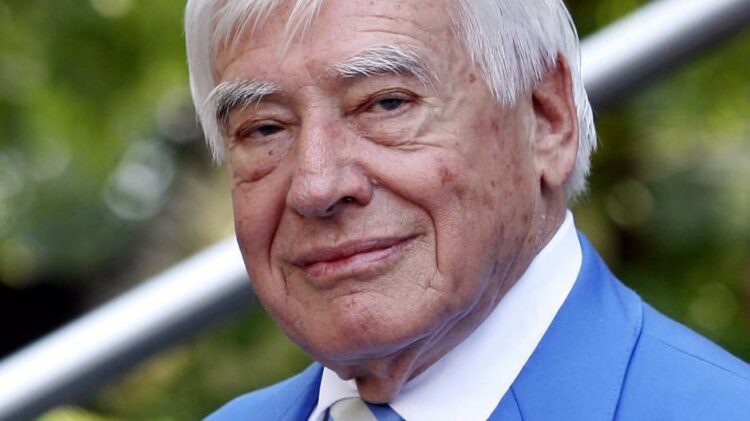
The 1995 Dayton Agreement cemented the path for nationalist and secessionist forces in Bosnia and Herzegovina which are trying to break up the state, a former top international official in Bosnia, Christian Schwarz Schilling, wrote in his commentary published by Deutsche Welle.
As High Representative between 2006 and 2007, Schwarz-Schilling was tasked with monitoring the civilian implementation of Bosnia’s Dayton Peace Agreement.
His latest comment on the situation in Bosnia and Herzegovina today follows:
“This year marks 25 years since the American town of Dayton, Ohio, went down in history. There, on November 21, 1995, after almost four years, the war in BiH ended following negotiations on a peace agreement, signed by the three presidents at the time, Slobodan Milosevic, Franjo Tudjman and Alija Izetbegovic, on December 14, 1995, in Paris.
In order to understand the current situation in BiH, 25 years after the signing of the Dayton Agreement, we must take a look at its origin, content and consequences.
The origin of the Dayton Agreement
In early 1994, the US administration of President Bill Clinton became heavily involved in the then wartime BiH, and in March 1994 mediated between Bosniaks (Muslims) and Bosnian Croats to establish the Federation of BiH. The federal model served the “Contact Group,” made up of the United States, Great Britain, France, Russia and Germany, as a cornerstone for later peace agreement negotiations.
The plan of the that “Contact Group” is based on the proposal of Russia, Great Britain and France for the persecution, that is the “ethnic cleansing” perpetrated by Serbs, to be accepted and to give them 49% of BiH's territory, although according to the 1991 census, only 31% of the population living in BiH were Serbs.
Later, even the relocation of different ethnic groups was accepted, only to better demarcate between “homogeneous” ethnic groups: Serbs on the one side and the Federation with Bosniaks and Croats on the other.
The United States, which had long opposed the recognition of the results of the war, nevertheless made a political turn in early 1995 and recognized the conquests of the war i.e. “ethnic cleansing”, and thus the territorial division in favour of the Serbs. Germany was the last country to agree to such a paradigm shift. With this territorial division, outlined by the Dayton Agreement, the aggressor was eventually rewarded, and those attacked were punished.
Can we talk about a just peace agreement here?

Contents of the Dayton Agreement
Under strong pressure from American negotiators, led by Richard Holbrooke, the war in Bosnia and Herzegovina ended in Dayton on November 21, 1995. Bosnia and Herzegovina survived as a state but divided into two entities: the Federation of BiH with a Croat and Muslim population and the Republika Srpska with a predominantly Serb population. A special administrative area has been established as well – Brcko District. The international community also envisioned the position of High Representative overseeing the implementation of the civilian part of the Dayton Agreement.
Three ethnic groups have received the right to a veto to protect their “vital national interests” to avoid tensions and possible disputes. Since then, this also means that members of the Presidency and the House of Peoples of the BiH Parliament can block any decision if the “constituent people” see it as a threat to their own vital interests.
After nearly four years of war, with more than 100,000 victims, over two million refugees, mass rapes, war prisoner camps and the Srebrenica genocide, Bosnian Serbs have been given half of Bosnia and Herzegovina. Facing the war crimes that were committed was as difficult as it is today, with a lot of effort and great effort. The Dayton Agreement favoured the main actors in war crimes in this segment. Despite everything, everyone was relieved when the agreement was signed.
After almost four long years, the international community has collected the broken fragments of its own weaknesses from the war in BiH – unfortunately too late for many people.
And Bosnians and Herzegovinians had to reorient themselves. Under the Dayton Accords, refugees had the right to return to their homes, which in the new situation meant a return to the newly created, ethnically divided entities. In practice, however, this return their homes in their old homeland looked completely different. Many gave up after years of unsuccessful attempts, sold their property and moved away. The country continued to be divided and “cleansed.”
The Dayton Agreement basically took away the democratic rights of all minorities, they practically do not exist in the BiH Constitution which envisages only three ethnic groups (Bosniaks-Muslims, Croats and Serbs) as constituent peoples. The basic rights of many Bosnians and Herzegovinians were erased by the Dayton Accords and distorted by the legal torso.
Consequences of the Dayton Agreement
It must be said that the Dayton Agreement made Bosnia and Herzegovina impossible to govern. I spent years studying the Dayton Agreement and the Constitution of Bosnia and Herzegovina, which is part of the Agreement, and tried unsuccessfully to amend the Constitution during my 2006 term as High Representative. All the Dayton negotiators at that time knew that the Peace Agreement and the Constitution built into it were in fact overcomplicated, imperfect and that there was a stumbling block in them at every step. However, they hoped, as Richard Holbrooke told me at the time in Dayton, that in time and if necessary with the help of the High Representative, the Agreement would be changed step by step.
However, in the past 25 years, no one has succeeded, neither the international community nor the Bosnians in changing the Constitution, and thus the Dayton Agreement. The then head of the German delegation to Dayton, Wolfgang Ischinger, said the agreement should have included a mandatory revision clause, so changes to the Dayton Agreement should have been made after about three years.
Today's BiH is unstable, the rule of law hardly exists, corruption is at a high level, poverty and social insecurity are constantly growing, and the population is declining because young and qualified people are leaving BiH for years and it is almost impossible to stop it. The Dayton Agreement and the BiH Constitution, however, remain unchanged, undermining democratic rights and thus leading the country deeper into hopelessness and further and further away from the EU.
BiH – the biggest loser of the wars in the former Yugoslavia
The international community still does not play a constructive role, is divided, disinterested and has been making the same mistakes for years as it did in the 1990s. Has the terrible war of that time been forgotten? The international community tolerates the aggressive and nationalist rhetoric of many BiH politicians which glorifies convicted war criminals for years.
It (the EU) could call on the help of a High Representative armed with Bonn powers to change that, but it is not doing so. Today, the responsibility of the international community to deal with Bosnia and Herzegovina more seriously must be appealed to in order to find a solution to get the country out of the status quo imposed by the Dayton Agreement. Or should we allow BiH to simply disintegrate after everything?
A strong player, Russia, which has its own interests, has been interfering in the situation in the region for a long time and mainly uses Serbia as an extended hand to bring unrest to the political landscape and to oppose the EU and the USA. A recent example of nationalist incidents following the Montenegrin elections should represent a red line for all.
Bosnia and Herzegovina is the biggest loser in the so-called Yugoslav wars. For 25 years since the establishment of Dayton, the “strength of facts” has determined political action and coexistence in all segments of life in BiH – and that has nothing to do with reconciliation and justice after the war. On the contrary, the Dayton Agreement cemented the path of nationalist and secessionist forces in Bosnia and Herzegovina, which have been striving to break up the state for decades.
Twenty-five years ago, then-BiH President Alija Izetbegovic said after the signing of the Dayton Agreement: “And I say to my people: This may not be a just peace, but it is more just than a continuation of the war. In a situation like this, and in the world as it is, it is not possible to achieve a better peace. God is our witness that we have done everything in our power to reduce the level of injustice for our country and our people.”
But we all know that without justice there can be no lasting peace. It is time for Bosnia and Herzegovina to experience justice.”





